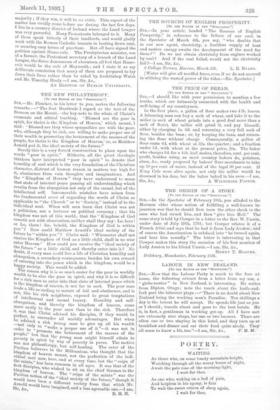THE NEW PHILANTHROPY.
[To THE EDITOR OF THE " SPECTATOR.") Sin,—Mr. Fletcher, in his letter to you, makes the following remarks :—" The first Beatitude I regard as the text of the Sermon on the Mount,—the key-note to the whoie of Christ's economic and ethical teaching. 'Blessed are the poor in spirit, for theirs is the Kingdom of Heaven,' which meant, I said : Blessed are they whose sympathies are with the poor, who, although they be rich, are willing to make proper use of their wealth in promoting the betterment of the masses of the people, for theirs is the Kingdom of Heaven,' or, as Matthew Arnold put it, the ideal society of the future."
Surely this is a very forced construction to place upon the words "poor in spirit." Hitherto, all the great theologio thinkers have interpreted "poor in spirit" to denote that humility of soul which is the very foundation of the Christian character, distrust of human reason in matters too high for it, abstinence from vain thoughts and imaginations. And the "Kingdom of Heaven" they have understood to mean that state of internal peace passing all understanding which results from the abnegation not only of the carnal, but of the intellectual self. Innumerable mistakes have arisen from the fundamental error of regarding the words of Christ as applicable to "the Church" or to "Society," instead of to the individual soul. When will men learn that Christ was not Sr politician, nor a lecturer on political economy ; that his kingdom was not of this world ; that the " Kingdom of God eemeth not with observation, neither shall they say : Lo, here! or Lo, there I for, behold, the Kingdom of God is within you"? How could Matthew Arnold's ideal society of the future be "within you" ? Christ said : "Whosoever shall not receive the Kingdom of God as a little child, shall in no wise enter Heaven." How could you receive the "ideal society of the future" as a little child, and thereby enter into it ? No doubt, if every man could live a life of Christian humility and abnegation, a secondary consequence, besides his own reward of entering into the peace which is the kingdom, would be a happy society. This would be added. The reason why it is so much easier for the poor in worldly wealth to be also the poor in spirit, and why it is so difficult for a rich man to enter into that state of internal peace which is the kingdom of heaven, is not far to seek. The poor man leads a life according to nature of toil and abstinence, and is not, like his rich neighbour, exposed to great temptations of intellectual and carnal luxury. Humility and self- abnegation, and thereby the kingdom of heaven, come im ore easily to the poor man than to the rich. Therefore t was that Christ advised his disciples, if they would be Perfect, to surrendera 11 worldly advantages. But when he advised a rich —not only to young man to give up all his wealth order to "make a proper use of it "—it was not in the betterment of the masses of the people," but that the young man might himself attain to poverty in spirit by wa was not philanthropy 3' of poverty in purse. The motive Puritan believers in tMillenniumeeamg. , but s self-healing. h r The error of the kingdom of heaven meant, t, who thought that the indi- vidual soul now, here, and, not the perfection of the indi- the saints," has been an at every time, but the "reign of first • • disciple% who wished toall ages. It was that of the o sit on the chief thrones in the kingdom of heaven. The "reign of the saints" was the Puritan notion of the "ideal society of the future," though it would have been a different society from that which Mr. Arnold would have imagined, and a less agreeable one.—I am, Sir, Sco., B, H. H.


































 Previous page
Previous page